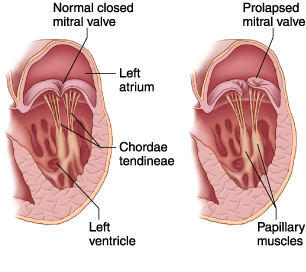Mitral Valve Disorders
Written By: Adam Pick, Patient Advocate, Author & Website Founder
Page Last Updated: May 13, 2025
When I was first diagnosed with a severe valve defect (which ultiimately required open heart surgery), I wanted to learn about the anatomy of the heart and the heart valves. I wanted to know what was wrong with my heart and how surgery would fix it. That said, here is some information to consider before we discuss mitral valve disorders.
Mitral Valve Anatomy
The heart has four chambers, a left and right atrium and a left and right ventricle, and four valves positioned between the chambers to control the flow of blood. The left side of the heart bears the brunt of the work required to pump blood through the heart and to the rest of the circulatory system. The two valves on this side of the heart, the mitral and the aortic, are the valves that most often need surgical repair or replacement.
The mitral valve is between the left ventricle and left atrium. The left atrium receives blood from the lungs that has been replenished with oxygen. The atrium then sends the blood through the mitral valve to the left ventricle. Flaps, also called mitral leaflets, on the valve open and close in response to the rhythm of the heartbeat to let the correct amount of blood through and then keep it from flowing back to the atrium. Disorders of the mitral valve can disrupt the critical flow of blood.

Mitral Valve Disorder Types
One disorder than can occur is mitral valve prolapse, also called ballooning valve, Barlow's, or floppy valve syndrome. In this condition, there is extra tissue on the leaflets of the mitral valve. Every time the heart contracts, this extra tissue bulges, or prolapses, in the left atrium. This can prevent the valve from closing properly. If the condition causes blood to leak back into the atrium, it is called mitral regurgitation. Mitral valve prolapse appears to have a genetic risk, since it can be prevalent within a family. It may also be linked to:
- Marfan syndrome
- Polycystic kidney disease
- Ehlers-Danlos syndrome
- Scoliosis
- Ebstein's disorder
Mitral Valve Disorder Symptoms
The majority of patients with mitral valve prolapse do not have complications for the disease and may have only a few mild symptoms. However, complications can occur, especially as the patient ages. In addition to regurgitation, the prolapse can cause arrhythmia, or an irregular heartbeat. Patients are also more at risk for endocarditis, an infection of the tissue lining the inside of the heart.
Mitral valve regurgitation, also known as mitral incompetence or mitral insufficiency, can result when blood flows back through the mitral valve to the atrium. This means that the atrium must now pump this returned blood along with the new supply it has received. If the condition is mild, it may be unnecessary to treat the disorder. However, if it is severe, the patient may need surgery to replace or repair the valve. Without correction, severe regurgitation can lead to serious arrhythmias (atrial fibrillation), an enlarged heart, or heart failure.
Many patients with mitral valve regurgitation experience no symptoms and are surprised to learn they have the disorder. This is because the condition typically remains mild and demonstrates a slow progression. However, some patients may experience heart palpitations, lightheadedness, fatigue, or shortness of breath. Exertion may exacerbate the symptoms. Some patients also have a cough, particularly when they lie down, swelling of the feet and ankles, and excessive urination. Most often, the first symptom noticed by a physician is a heart murmur he hears during a routine examination.
Mitral Valve Disorder Causes
There are many causes linked to mitral valve regurgitation. Some patients are born with the condition, while others develop it as a result of the wear the valve receives over the lifespan. Bacterial endocarditis, an infection of the inner lining of the heart, can damage the mitral valve. In some patients who experience a previous heart attack, the area of the heart supporting the valve can be damaged. High blood pressure, if left untreated, can enlarge the left ventricle, stretching the area around the valve. Mitral valve prolapse can cause regurgitation, as can damage from rheumatic fever. The cords anchoring the leaflets to the wall of the heart can be damaged, stretched or torn.
Mitral Valve Stenosis... Another Mitral Valve Disorder
Mitral valve stenosis is a disorder in which there is a narrowing that prevents the valve from operating properly. The primary cause is scarring from rheumatic fever, a complication of strep throat. Some patients may remain asymptomatic for many decades. Others may experience heart palpitations, fatigue, or breathing difficulties, especially when they exert themselves physically. Other symptoms can include a heavy cough, frequent upper respiratory infections, and swollen ankles or feet. Occasionally, a patient may experience chest pain. Symptoms of mitral valve stenosis can develop at any age, including infancy, but are most often seen in patients who are middle-aged or older.
As mitral valve stenosis progresses, complications can result. These include heart failure, atrial fibrillation, and an enlarged heart. Patients are also at greater risk for blood clots, which may form in the heart and then travel, sometimes leading to serious consequences such as a stroke.
Mitral Valve Disorder Treatment
Treatment for mitral valve disorders will depend on which condition the patient has, its severity, and the patient's age and health. Open-heart surgery, using median sternotomy (sternum breaking) is often required in the form of a mitral valve repair or a mitral valve replacement procedure. Newer, less-invasive procedures are sometimes avaialble to the patient but are dependent upon the patient's health history and the surgeons skill set.
You Might Also Like
To learn more about mitral valve disorders, here is additional educational information and patient updates that can help you:





